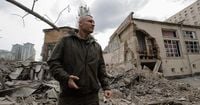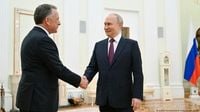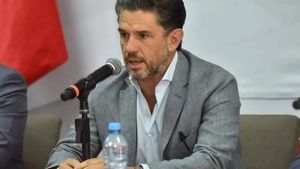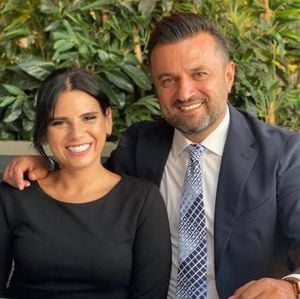In a surprising turn of events, Kyiv's Mayor Vitali Klitschko has suggested that Ukraine may need to make territorial concessions to Russia as part of a peace agreement, igniting a wave of discontent among Ukrainian lawmakers. Klitschko's comments, made during a BBC interview on April 25, 2025, followed a devastating missile attack on Kyiv that resulted in at least 12 deaths and over 80 injuries, marking one of the deadliest days for the capital in recent memory.
"One of the scenarios is... to give up territory. It's not fair. But for peace, temporary peace, maybe it can be a solution," Klitschko stated, acknowledging the harsh realities of the ongoing conflict. His remarks came amid escalating pressure from U.S. President Donald Trump, who has been advocating for a negotiated settlement to the war that has ravaged Ukraine since 2022.
Klitschko's assertion that Ukraine might have to consider temporary territorial concessions has not been well-received by many lawmakers. Yaroslav Yurchyshyn, a member of the Holos party and chairman of the parliamentary committee on freedom of speech, firmly stated, "No politician in Ukraine is authorized to change Ukraine's borders — this is the sovereign right of the Ukrainian people alone." He emphasized that such proposals only serve to embolden the enemy and undermine Ukraine's sovereignty.
In a subsequent clarification on Telegram, Klitschko reiterated his position, stating, "I said that Ukraine could be forced to make territorial concessions in exchange for ending the war. Unfortunately, as we see, such a scenario is quite possible." He expressed that many international figures have discussed the possibility of territorial concessions, but he also stressed that Ukrainians would "never accept occupation" by Russia.
Oleksandr Merezhko, chair of the parliament's foreign affairs committee, echoed this sentiment, asserting that Ukraine would never agree to any territorial concessions and would retain sovereignty over occupied territories. Merezhko remarked, "The truth is, Ukraine will always retain its sovereignty over temporarily occupied territories. The question is when these territories will be returned and by what means — military or diplomatic means?"
Inna Sovsun, another lawmaker from the Holos party, expressed skepticism regarding the idea of conceding territory, saying, "If you offer your arm to a tiger, don’t be surprised when it takes your whole body." This sentiment reflects a broader concern among Ukrainian officials that any concessions could lead to further aggression from Russia.
The discussion surrounding territorial concessions gained momentum earlier in the week when reports emerged indicating that the Trump administration was considering recognizing Russia's control over Crimea, which was illegally annexed in 2014. A peace proposal presented to U.S. officials by Ukrainian and European representatives included robust security guarantees but stipulated that discussions about territorial concessions would only occur after a full and unconditional ceasefire.
Trump, in a post on his social media platform, claimed that Moscow and Kyiv are "very close" to a deal, urging both sides to finalize the terms. However, he criticized Ukrainian President Volodymyr Zelenskyy for not signing a controversial mineral deal with the U.S., suggesting that Ukraine's best chance for future security assistance hinges on granting access to critical rare earth materials.
Despite the pressure from the U.S., Zelenskyy has remained firm in his stance regarding Crimea, stating that it "belongs" to Ukraine and that he cannot recognize the occupation of the peninsula. He emphasized, "Our position is unchanged: only the Ukrainian people have the right to decide which territories are Ukrainian. The constitution of Ukraine says that all the temporarily occupied territories belong to Ukraine, to the Ukrainian people."
As the situation continues to evolve, the Ukrainian government faces significant challenges in navigating the delicate balance between pursuing peace and maintaining national sovereignty. Klitschko's remarks, while reflecting a potential shift in the political landscape, have sparked a fierce debate about the implications of any territorial concessions.
U.S. President Donald Trump's envoy, Steve Witkoff, recently met with Russian President Vladimir Putin to discuss proposals aimed at ending the war. Following their meeting, Kremlin foreign policy aide Yuri Ushakov described the discussions as constructive and useful, indicating a willingness from both sides to explore avenues for peace.
However, the ongoing violence and recent attacks, including the missile strike that devastated Kyiv, underscore the urgency of finding a resolution. As Ukrainian officials continue to evaluate their options, the question of how to achieve a lasting peace without compromising territorial integrity remains paramount.
As of April 2025, the three-year conflict has resulted in an estimated 1.2 million casualties, highlighting the dire need for a solution that respects Ukraine's sovereignty while addressing the immediate humanitarian crisis. The stakes are high, and the path forward remains fraught with challenges as both domestic and international pressures mount.






